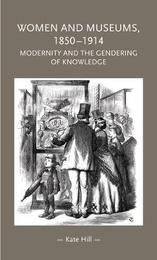
|
Women and Museums, 1850-1914: Modernity and the Gendering of Knowledge
Hardback
Main Details
| Title |
Women and Museums, 1850-1914: Modernity and the Gendering of Knowledge
|
| Authors and Contributors |
By (author) Kate Hill
|
| Series | Gender in History |
|---|
| Physical Properties |
| Format:Hardback | | Pages:272 | | Dimensions(mm): Height 216,Width 138 |
|
| ISBN/Barcode |
9780719081156
|
| Classifications | Dewey:069.09 |
|---|
| Audience | | Postgraduate, Research & Scholarly | |
|---|
| Illustrations |
11 black & white illustrations
|
|
Publishing Details |
| Publisher |
Manchester University Press
|
| Imprint |
Manchester University Press
|
| Publication Date |
21 June 2016 |
| Publication Country |
United Kingdom
|
Description
"This is the first attempt to recover the entirety of women's contribution to British museums in the period 1850-1914. It sheds lights on women as museum workers, donors and visitors, demonstrates that through such roles women profoundly influenced the development of museums in the period and suggests that museums were a key site for the development of modern gendered identities"--Back cover.
Author Biography
Kate Hill is Principal Lecturer in History at the University of Lincoln -- .
Reviews'Kate Hill's Women and Museums, 1850-1914: Modernity and the Gendering of Knowledge, part of Manchester University Press's Gender in History series, is not only a masterful work of historical scholarship and careful theoretical, historiographical, and methodological intervention, but also a bracingly relevant and important book. In her sophisticated and nuanced treatment of gender and museums (including all kinds of collections, in all kinds of institutional settings), Hill makes a remarkable contribution that deserves to be read by all those interested in Victorian history and gender, as well as those specifically studying museums and collections. Crucially, her work also helps us think about the interactions between gender, power, and knowledge production in our own day. What comes out of this remarkable study, then, is a new way to appreciate the extraordinarily malleable and fascinating space that is the modern museum, in all of its many guises.' Amy Woodson-Boulton, Loyola Marymount University, Victorian Studies, Vol 60, No. 3 -- .
|